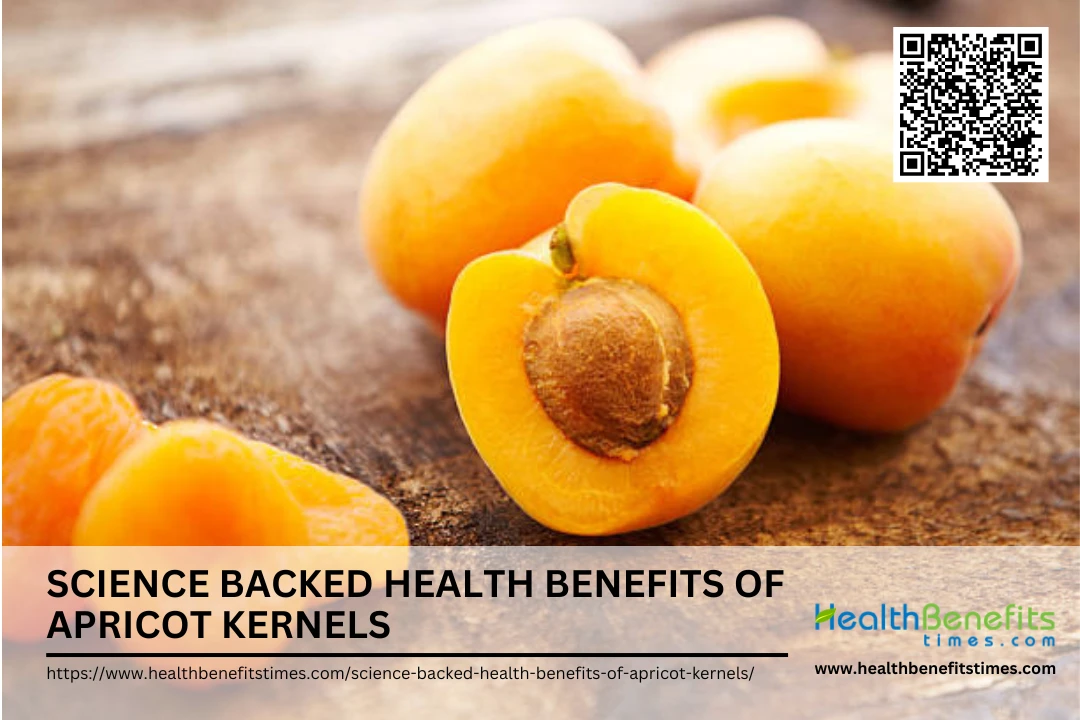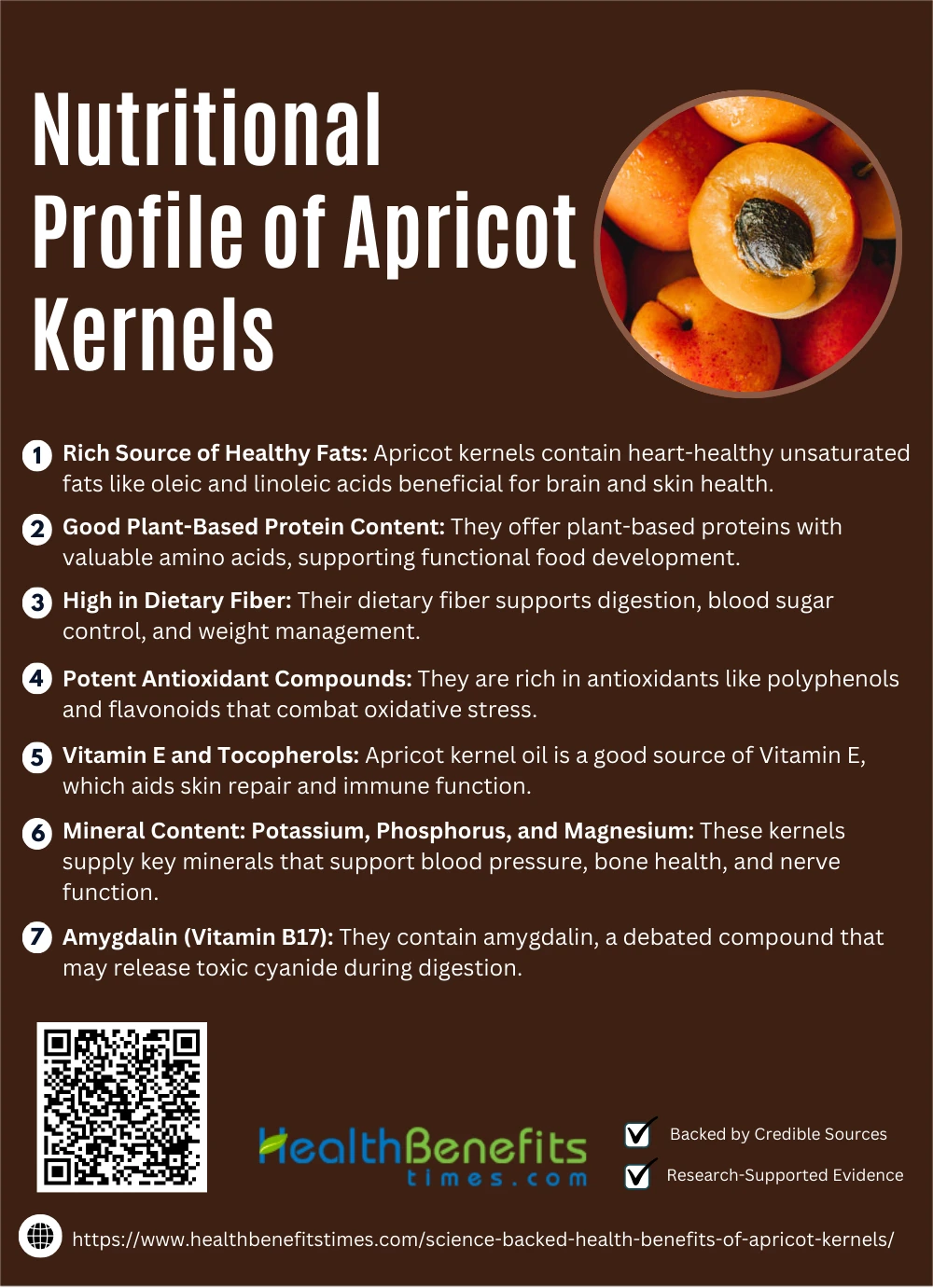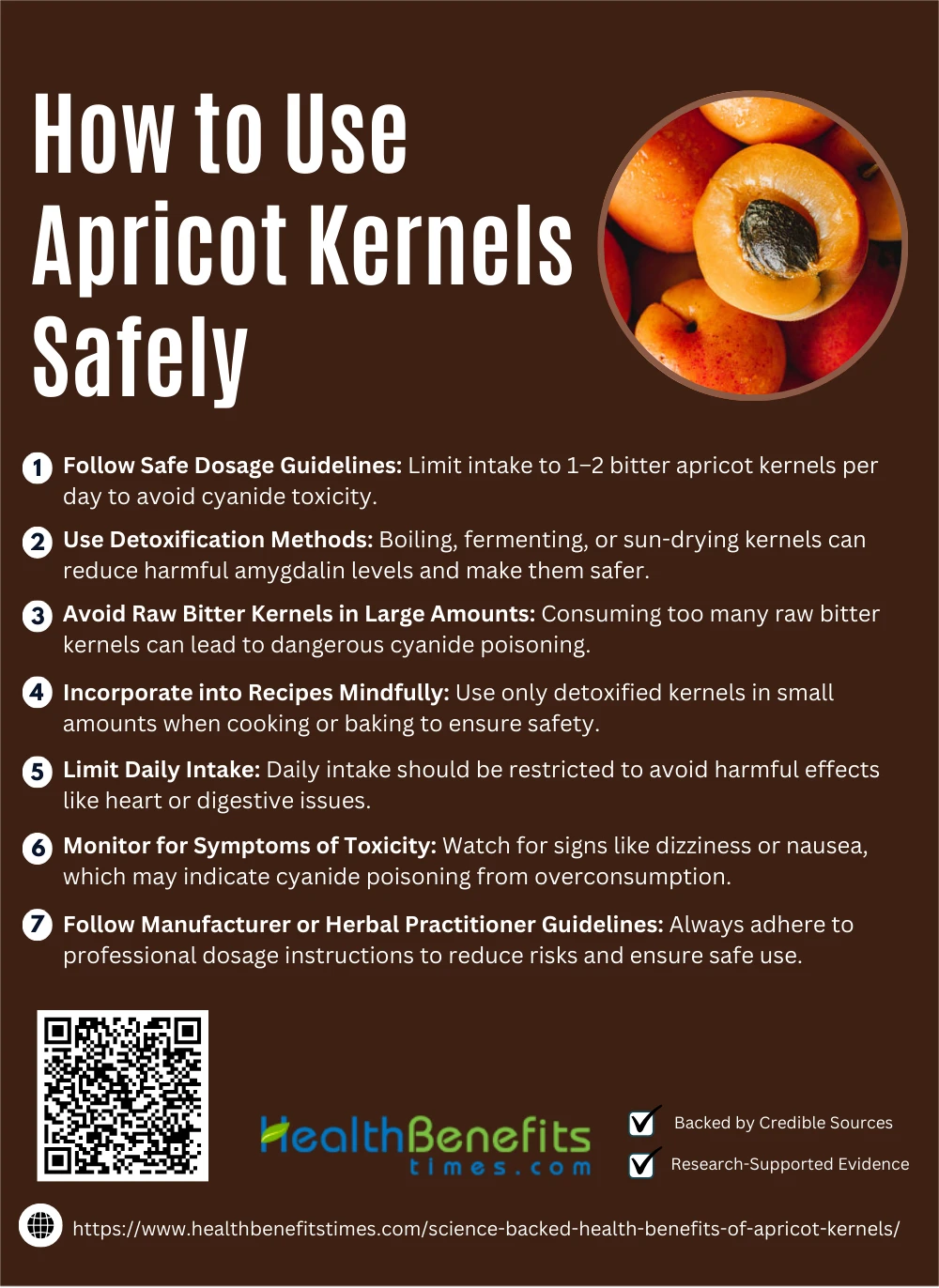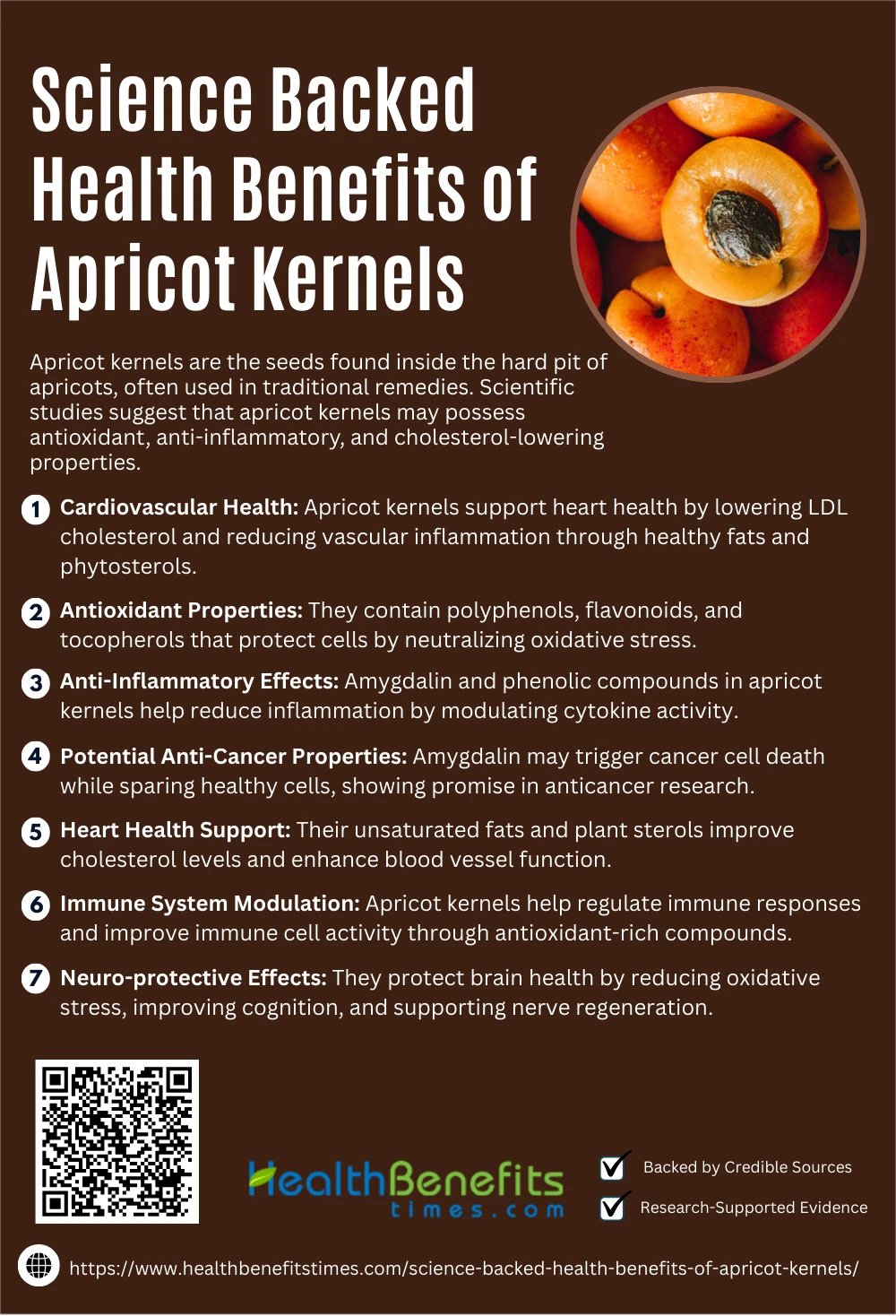- Apricot kernels are the seeds found inside the hard pit of apricots, often used in traditional remedies.
- Scientific studies suggest that apricot kernels may possess antioxidant, anti-inflammatory, and cholesterol-lowering properties.
- Research supports potential benefits in metabolic health, though safe consumption limits are critical due to cyanide content.
 Apricot kernels are the seeds found inside the hard pit of apricots, traditionally used in various cultures for medicinal and culinary purposes due to their nutritional and phytochemical richness. The potential health benefits of apricot kernels have recently drawn attention in scientific research, with studies highlighting their antioxidant, anti-inflammatory, and immune-boosting effects. Rich in bioactive compounds such as amygdalin (also known as vitamin B17), essential fatty acids, and polyphenols, apricot kernels are being investigated for their therapeutic promise against chronic diseases. A comprehensive review of the Malatya apricot, a geographically protected variety, underscores the kernels’ functional and nutritional importance, linking their phytochemical profile to improved cardiovascular and metabolic health. Moreover, incorporation of apricot kernel oil into food formulations, such as milk chocolate, has demonstrated not only sensory enhancement but also boosted antioxidant potential—further supporting their functional food value.
Apricot kernels are the seeds found inside the hard pit of apricots, traditionally used in various cultures for medicinal and culinary purposes due to their nutritional and phytochemical richness. The potential health benefits of apricot kernels have recently drawn attention in scientific research, with studies highlighting their antioxidant, anti-inflammatory, and immune-boosting effects. Rich in bioactive compounds such as amygdalin (also known as vitamin B17), essential fatty acids, and polyphenols, apricot kernels are being investigated for their therapeutic promise against chronic diseases. A comprehensive review of the Malatya apricot, a geographically protected variety, underscores the kernels’ functional and nutritional importance, linking their phytochemical profile to improved cardiovascular and metabolic health. Moreover, incorporation of apricot kernel oil into food formulations, such as milk chocolate, has demonstrated not only sensory enhancement but also boosted antioxidant potential—further supporting their functional food value.
Distinction between bitter vs. sweet apricot kernels
Here is a clear distinction table between Bitter and Sweet Apricot Kernels, highlighting their key differences in composition, usage, taste, and safety:
| Characteristic | Bitter Apricot Kernels | Sweet Apricot Kernels |
| Source Variety | Derived from wild apricot species (e.g., Prunus armeniaca var. ansu) | From cultivated varieties of apricots |
| Taste | Intensely bitter | Mild, slightly sweet |
| Amygdalin Content (Cyanogenic) | High (up to 5% by weight) | Very low or negligible |
| Toxicity Risk | High – Can release hydrogen cyanide (HCN) upon digestion | Low – Considered safe in moderate culinary use |
| Therapeutic Use | Used in traditional medicine for cancer, cough relief, and anti-inflammation | Rarely used therapeutically |
| Edibility (Raw) | Not safe for raw consumption – requires detoxification | Can be eaten in small quantities |
| Common Usage | Traditional Chinese Medicine, alternative cancer therapies | Snacking, baking, cosmetic oil production |
| Regulatory Status | Restricted in many countries due to cyanide poisoning risk | Generally regarded as safe (GRAS) in food |
| Flavoring Use | Sometimes used (in minute amounts) for amaretto and almond flavor | Preferred for nut-based recipes and snacks |
| Preparation Needs | Requires heat treatment (e.g., boiling or roasting) to reduce toxicity | Often used raw or lightly processed |
Nutritional Profile of Apricot Kernels
Apricot kernels are rich in nutrients like healthy fats, protein, fiber, vitamins, and minerals. Their unique composition makes them a subject of interest in both traditional and modern nutritional research.
 1. Rich Source of Healthy Fats
1. Rich Source of Healthy Fats
Apricot kernels are notably high in monounsaturated and polyunsaturated fatty acids, including oleic and linoleic acids. These fats are heart-healthy and support brain and skin health. According to a comparative analysis in Food Bioscience, cold-pressed apricot kernel oil shows high lipid quality, suggesting its potential in nutraceutical and cosmetic applications.
2. Good Plant-Based Protein Content
These kernels provide a modest amount of plant protein, making them a useful supplementary protein source. Studies have shown that defatted apricot kernel flour, a by-product of oil extraction, contains valuable amino acids and can be integrated into functional foods like cheese alternatives.
3. High in Dietary Fiber
Apricot kernels, especially when ground into flour or left unrefined, contain substantial dietary fiber. This promotes digestive health and helps in glycemic control. Fiber also plays a role in satiety, contributing to weight management. A 2025 study on kernel-derived snacks highlighted enhanced nutritional properties due to the fiber content.
4. Potent Antioxidant Compounds
Apricot kernels are loaded with antioxidant phytochemicals such as polyphenols and flavonoids. These bioactives help neutralize free radicals and reduce oxidative stress. A 2025 study in Journal of Food Measurement and Characterization confirmed that antioxidant levels remained high even after controlled heat processing.
5. Vitamin E and Tocopherols
The oil derived from apricot kernels contains significant amounts of tocopherols, especially alpha-tocopherol, a form of Vitamin E. This vitamin is vital for immune function and skin repair. Research confirms its contribution to the oxidative stability of apricot kernel oil, further validating its role in health and cosmetics.
6. Mineral Content: Potassium, Phosphorus, and Magnesium
Apricot kernels contribute essential minerals like potassium (important for blood pressure control), phosphorus (vital for bones), and magnesium (linked to nerve and muscle function). Their inclusion in bakery items like seed-oil crackers improved nutritional and mineral profiles.
7. Amygdalin (Vitamin B17)
Amygdalin is a controversial compound abundant in bitter apricot kernels, sometimes referred to as Vitamin B17. While it’s been historically linked to anti-cancer claims, modern science warns of its ability to release cyanide during digestion. Its presence is significant from both a biochemical and safety perspective.
Potential Health Benefits of Apricot Kernels
Apricot kernels have gained attention for their potential health benefits, including antioxidant, anti-inflammatory, and anticancer properties. These effects are primarily linked to compounds like amygdalin, essential fatty acids, and polyphenols.
Apricot kernels are gaining attention for their cardiovascular benefits, largely due to their rich content of unsaturated fatty acids and phytosterols like stigmasterol, which help lower LDL cholesterol and improve arterial function. (1) Their co-administration with metabolic-supporting compounds enhances cardiovascular outcomes. (2) Additionally, kernel-derived oils support lipid metabolism, reduce atherosclerotic markers, and modulate vascular inflammation. (3) (4) (5)
2. Antioxidant Properties
Apricot kernels possess potent antioxidant properties thanks to high concentrations of polyphenols, flavonoids, and tocopherols, which neutralize free radicals and reduce oxidative stress. (6) Their antioxidant capacity is enhanced through fermentation and controlled heat treatment. (7) Sweet kernel-based products like enriched yoghurt also retain strong antioxidant functions. (8) Cold-pressed oils show significant oxidative stability, and cracker formulations with kernel oil improve functional health benefits. (5) (9)
3. Anti-Inflammatory Effects
Apricot kernels exhibit significant anti-inflammatory activity, largely attributed to amygdalin and phenolic compounds that modulate cytokines like TNF-α and IL-6. (10) Apricot kernel oil has reduced inflammation and pain in neuropathic rat models. (11) Cognitive recovery and inflammatory suppression post-stroke have also been observed. These effects are enhanced through antioxidant synergy and flavonoid-rich oil extracts. (7) (5)
4. Potential Anti-Cancer Properties
Amygdalin, a cyanogenic glycoside from apricot kernels, has drawn research interest for its potential to induce apoptosis in cancer cells without harming healthy ones. (12) Studies highlight its DNA-fragmenting ability in malignancies, especially under oxidative stress. (6) Apricot kernel extract modulates pro-apoptotic gene expression in vitro, while its anticancer promise is enhanced by synergistic phytochemicals. (5) (3) Nutritional approaches incorporating it show emerging functional food potential. (8)
5. Heart Health Support
Apricot kernels support heart health through their rich content of unsaturated fats and phytosterols like stigmasterol, which aid in lowering LDL cholesterol and enhancing vascular flexibility. (1) These components work synergistically to reduce atherosclerotic risk. (2) Apricot kernel oil also improves lipid metabolism and anti-inflammatory markers, supports endothelial health, and reduces oxidative stress, further protecting cardiac tissues. (4) (5) (7)
6. Immune System Modulation
Apricot kernels have demonstrated immunomodulatory effects by enhancing immune responses and regulating cytokine expression. A key study showed that dietary apricot kernels improved immune-cell function and gene expression related to immunity in aquatic models. (3) These effects are linked to kernel-derived polyphenols and fatty acids, which also possess antioxidant synergy. (5) Additional studies note enhanced nutrient absorption and immune resilience, while fermented kernel extracts further boost immune-regulatory pathways and T-cell responses. (13) (6) (7)
7. Neuro-protective Effects
Apricot kernels exhibit neuroprotective potential primarily due to amygdalin, which modulates oxidative stress and neurotransmitter imbalances in neurodegenerative disorders. A recent study demonstrated that amygdalin and its nano-formulations improved cognitive performance and reduced neuronal apoptosis in Alzheimer’s models. (14) Additionally, kernel oil enhances nerve regeneration and reduces neuroinflammation, while fermented kernel extracts exhibit cognitive protection through antioxidant mechanisms. (6) (11) Apricot-derived tocopherols further safeguard neuronal integrity, with animal studies supporting memory retention benefits. (5)
Traditional and Cultural Uses
Traditionally, apricot kernels have been used in various cultures for medicinal and culinary purposes. They were valued in ancient Chinese, Middle Eastern, and Mediterranean practices for promoting wellness and treating ailments.
- Traditional Chinese Medicine (TCM): Used for centuries under the name Xing Ren, apricot kernels are prescribed to relieve coughs, asthma, and constipation due to their warming and moistening properties.
- Ayurvedic Medicine (India): Applied for treating inflammatory conditions, skin issues, and joint pains; also incorporated in herbal oils for massage.
- Middle Eastern & Central Asian Cuisine: Sweet apricot kernels are consumed as snacks and used in making marzipan-like confections, pastries, and nut pastes.
- North African Traditional Remedies: Bitter kernels are sometimes ground and mixed with honey or dates for digestive tonics or pain relief.
- Mediterranean Folk Medicine: Used in poultices or infusions to address skin irritations, bruises, or eczema, leveraging the kernel oil’s emollient effects.
- Persian and Turkish Herbalism: Kernel oil (Roghan-e-Kadu) is used for hair health, anti-aging skin care, and heart tonics, especially in Unani medicine.
- Central Asian Skincare Practices: Apricot kernel oil is favored for dry skin treatments, sunburn relief, and cosmetic massages, believed to rejuvenate and protect skin.
- Caucasus Mountains Traditions: Apricot seed oil and flour are historically used for cardiovascular and immune boosting tonics during harsh winters.
How to Use Apricot Kernels Safely
Using apricot kernels safely involves understanding proper dosage, preparation, and potential risks. Awareness of bitter versus sweet varieties is crucial to avoid toxicity and ensure their safe inclusion in health routines.
 1. Follow Safe Dosage Guidelines
1. Follow Safe Dosage Guidelines
Consuming apricot kernels requires strict adherence to dosage limits due to their amygdalin content. Health authorities recommend no more than 1–2 bitter kernels daily to avoid cyanide toxicity. (15) Overconsumption has led to severe health cases, including cardiac risks, and cyanide poisoning episodes. (16) (17)
2. Use Detoxification Methods
Detoxifying apricot kernels before consumption reduces cyanide risk. Effective methods include boiling, fermentation, and sun-drying, which significantly lower amygdalin levels. (18) These processes retain nutritional value while ensuring safety, and make kernels suitable for use in foods and supplements. (19) (20)
3. Avoid Raw Bitter Kernels in Large Amounts
Consuming raw bitter apricot kernels in excess can cause cyanide poisoning due to high amygdalin levels. Documented toxic reactions have led to regulatory warnings from EFSA. (21) Studies recommend strict consumption limits, as even moderate intake may trigger adverse effects. (20) (22)
4. Incorporate into Recipes Mindfully
Processed apricot kernels can be safely used in recipes when detoxified and added in small amounts. Studies show heat-treated kernel flour retains nutrients with reduced cyanide risk. (18) Safe incorporation is ideal in baked goods and cereal bars, while detoxified oil is also suitable for culinary use. (19) (20)
5. Limit Daily Intake
To prevent cyanide toxicity, it’s critical to limit intake of bitter apricot kernels. The EFSA recommends no more than 1–2 kernels per day for adults. (21) Overconsumption has caused adverse effects, including cardiovascular symptoms and digestive complications when kernels are used in excess. (23) (17)
6. Monitor for Symptoms of Toxicity
Early symptoms of cyanide poisoning from apricot kernels include dizziness, nausea, rapid breathing, and weakness. A canine study reported severe toxicity from kernel meals. (24) Toxic effects have also been assessed in phytochemical extracts and include systemic signs like metabolic acidosis. (21) (25)
7. Follow Manufacturer or Herbal Practitioner Guidelines
Safe apricot kernel use depends on adhering to dosage and preparation instructions from credible manufacturers or herbal practitioners. Clinical reviews emphasize the risks of self-medication and advocate professional guidance for herbal intake. (26) Practitioners ensure quality control and reduce toxicity risks. (27) (28)
Potential side effects of Apricot kernels
Apricot kernels may pose health risks due to amygdalin, which can release toxic cyanide when consumed in excess. Understanding these concerns is vital for safe and informed consumption practices.
Apricot kernels contain amygdalin, a cyanogenic glycoside that can release toxic hydrogen cyanide upon ingestion, posing serious health risks. Clinical cases have shown that consuming even moderate quantities can lead to acute poisoning, particularly when the kernels are ground or chewed, increasing cyanide release. (24) The U.S. FDA and other authorities have restricted their use due to potential toxicity, particularly among alternative medicine users seeking non-evidence-based treatments. (29) Studies show significant cyanide levels in bitter apricot varieties, highlighting the need for public awareness and proper regulation. (30)
2. Gastrointestinal Distress
Consumption of apricot kernels has been linked to gastrointestinal disturbances due to the hydrolysis of amygdalin, which may disrupt gut microbial balance and trigger digestive inflammation. Botanical compounds like these have shown adverse effects when consumed in excess. (31) Additionally, the microbial dysbiosis induced by such natural substances may exacerbate pre-existing gastrointestinal conditions, prompting concern in vulnerable populations. (31)
3. Cardiac Complications
Apricot kernels, through their cyanogenic content, can induce serious cardiovascular reactions including arrhythmias and myocardial stress. Documented cases reveal that amygdalin exposure in susceptible individuals can aggravate tachycardia and cardiomyopathy. (17) Co-consumption with other stimulants, such as caffeine, worsens outcomes due to synergistic metabolic stress. (2) These effects underscore the risks of herbal self-medication involving apricot seed derivatives. (17)
4. Reproductive and Hormonal Effects
Apricot kernels contain amygdalin, a cyanogenic glycoside, which metabolizes into cyanide and may disrupt endocrine functions. Research has shown potential hormonal imbalance and testicular toxicity associated with excessive consumption in animal models (Mansour et al., 2019). Another study highlights oxidative stress effects on male reproductive organs. (32) Additionally, apricot kernel extract interfered with hormone receptors and ovarian follicle development in mice. (33)
5. Allergic Reactions
Apricot kernels can trigger allergic reactions due to their protein content, notably amandin, a major allergen also found in almonds. A study confirmed immunoreactivity of amandin in apricot kernels, posing risk to sensitized individuals. (34) Another report demonstrated that hydrolyzed apricot kernel proteins retained allergenic potential. (35) Furthermore, clinical literature links ingestion to acute allergic symptoms such as erythema and swelling. (36)
6. Interactions with Medications
Apricot kernels, especially in herbal mixtures like Ephedra-bitter almond formulas, can interact with conventional drugs by modulating liver enzymes or immune signaling pathways. Such interactions may alter drug metabolism, causing toxicity or reduced efficacy. (37) Their influence on inflammatory pathways also affects medications targeting cytokines. (38) Additionally, co-administration with anti-inflammatories or chemotherapy agents requires caution due to potential biochemical conflicts. (39)
7. Misuse in Unregulated Treatments
Despite known toxicity, apricot kernels are misused in alternative medicine, especially as unverified cancer remedies. These practices bypass clinical oversight, leading to serious health consequences, including cyanide poisoning. (19) Studies reveal widespread unsupervised use in traditional therapies, risking adverse reactions or interference with standard treatments. (40) Public health reviews underscore the need for better regulation and awareness. (26)
Conclusion
Apricot kernels offer a unique blend of nutrients and bioactive compounds that have shown potential in promoting health, particularly through antioxidant, anti-inflammatory, and immune-supporting effects. While some studies suggest possible anti-cancer properties, these claims remain controversial and require more scientific validation. It’s crucial to recognize the risks, especially cyanide toxicity associated with bitter kernels, and to consume them with caution and awareness. Traditional use reflects their longstanding place in natural medicine, but modern science encourages responsible usage. As with any natural remedy, consulting a healthcare professional before incorporating apricot kernels into your routine is essential for safety and effectiveness.




